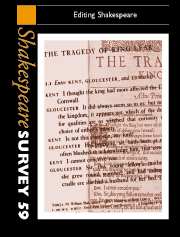Book contents
- Frontmatter
- Editing Shakespeare’s Plays in the Twentieth Century
- Crisis in Editing?
- On Being a General Editor
- Altering the Letter of Twelfth Night: ‘Some are born great’ and the Missing Signature
- ‘A Thousand Shylocks’: Orson Welles and The Merchant of Venice
- The Date and Authorship of Hand D’s Contribution to Sir Thomas More: Evidence from ‘Literature Online’
- Ferdinand’s Wife and Prospero’s Wise
- Editing Stefano’s Book
- Manuscript, Print and the Authentic Shakespeare: The Ireland Forgeries Again
- The Author, the Editor and the Translator: William Shakespeare, Alexander Chalmers and Sándor Petofi or the Nature of a Romantic Edition
- Women Edit Shakespeare
- The Shakespeare Edition in Industrial Capitalism
- Print and Electronic Editions Inspired by the New Variorum Hamlet Project
- The Evolution of Online Editing: Where Will it End?
- The Director as Shakespeare Editor
- The Editor as Translator
- Performance Editions, Editing and Editors
- Editing Collaborative Drama
- Will in the Universe: Shakespeare’s Sonnets, Plato’s Symposium, Alchemy and Renaissance Neoplatonism
- Giants and Enemies of God: The Relationship between Caliban and Prospero from the Perspective of Insular Literary Tradition
- Shakespeare’s Ages
- Who Wrote William Basse’s ‘Elegy on Shakespeare’?: Rediscovering a Poem Lost from the Donne Canon
- ‘Sometime a Paradox’: Shakespeare, Diderot and the Problem of Character
- Shakespeare Performances in England, 2005
- Professional Shakespeare Productions in the British Isles, January–December 2004
- The Year's Contributions to Shakespearian Study 1 Critical Studies
- 2 Shakespeare in Performance
- 3 Editions and Textual Studies
- Index
The Author, the Editor and the Translator: William Shakespeare, Alexander Chalmers and Sándor Petofi or the Nature of a Romantic Edition
Published online by Cambridge University Press: 28 March 2007
- Frontmatter
- Editing Shakespeare’s Plays in the Twentieth Century
- Crisis in Editing?
- On Being a General Editor
- Altering the Letter of Twelfth Night: ‘Some are born great’ and the Missing Signature
- ‘A Thousand Shylocks’: Orson Welles and The Merchant of Venice
- The Date and Authorship of Hand D’s Contribution to Sir Thomas More: Evidence from ‘Literature Online’
- Ferdinand’s Wife and Prospero’s Wise
- Editing Stefano’s Book
- Manuscript, Print and the Authentic Shakespeare: The Ireland Forgeries Again
- The Author, the Editor and the Translator: William Shakespeare, Alexander Chalmers and Sándor Petofi or the Nature of a Romantic Edition
- Women Edit Shakespeare
- The Shakespeare Edition in Industrial Capitalism
- Print and Electronic Editions Inspired by the New Variorum Hamlet Project
- The Evolution of Online Editing: Where Will it End?
- The Director as Shakespeare Editor
- The Editor as Translator
- Performance Editions, Editing and Editors
- Editing Collaborative Drama
- Will in the Universe: Shakespeare’s Sonnets, Plato’s Symposium, Alchemy and Renaissance Neoplatonism
- Giants and Enemies of God: The Relationship between Caliban and Prospero from the Perspective of Insular Literary Tradition
- Shakespeare’s Ages
- Who Wrote William Basse’s ‘Elegy on Shakespeare’?: Rediscovering a Poem Lost from the Donne Canon
- ‘Sometime a Paradox’: Shakespeare, Diderot and the Problem of Character
- Shakespeare Performances in England, 2005
- Professional Shakespeare Productions in the British Isles, January–December 2004
- The Year's Contributions to Shakespearian Study 1 Critical Studies
- 2 Shakespeare in Performance
- 3 Editions and Textual Studies
- Index
Summary
Sándor Petőfi (1823–49), a major Romantic poet writing in Hungarian, translated William Shakespeare’s Coriolanus in 1848. Whose Coriolanus?, we should pause and ask, bearing in mind the long and distinguished tradition of editing Shakespeare. Is it the Coriolanus of John Heminges and Henry Condell, Nicholas Rowe, Alexander Pope, Lewis Theobald, William Warburton, Thomas Hanmer, Samuel Johnson, Edward Capell, George Steevens and Isaac Reed, Edmond Malone and James Boswell, Samuel W. Singer, Charles Knight or John Payne Collier? Any historical survey on editing Shakespeare will reveal the differences between these editors, and monographs on the individual achievements often present the edition in question as a paradigm shift. The corpus we know as ‘Shakespeare’ is redefined by each editor and in each edition.
However, some editions receive more and some less attention in this process of redefinition. The historiography of editing Shakespeare has its privileged areas of research. The textual schools of the twentieth century, New Bibliography and the post-structuralist schools triggered a new theoretical interest in both the seventeenth-century early printings and in the ‘long eighteenth-century’ of Shakespeare-editing (1709–1821). On the contrary, the history of nineteenth-century editions is an under-researched field. Although Andrew Murphy in his indispensable Shakespeare in Print devotes two chapters to the popular and scholarly editions in the nineteenth-century from the perspectives of editing and publishing, by the nature of such a comprehensive historical account it cannot extend to case studies.
In the literature, nineteenth-century editors are either perceived as derivative of the grand eighteenth-century traditions or as representatives of an interim period (in want of theory) falling in between two great centuries of Shakespearean editorial theory. For the first attitude I quote Andrew Murphy who writes that ‘the eighteenth-century editorial tradition cast something of a long shadow beyond its own immediate period’ and ‘[m]ost of the editions produced for the popular market over the course of the 1800s were highly derivative’. To illustrate the second claim, Paul Werstine notes when comparing the editions of Charles Knight (idealizing the Folio) and John Payne Collier (championing the Quartos) that ‘[t]he wide differences between the editions of Knight and Collier testify to the lack of consensus on the relations among the early printed texts. No theory was available in the absence of documents that could be construed as the ground of such a theory.’
- Type
- Chapter
- Information
- Shakespeare Survey , pp. 124 - 135Publisher: Cambridge University PressPrint publication year: 2006

